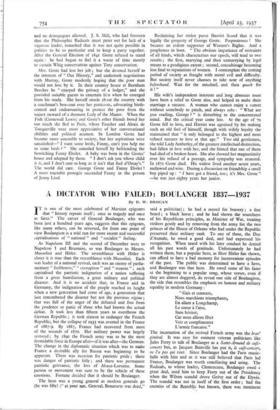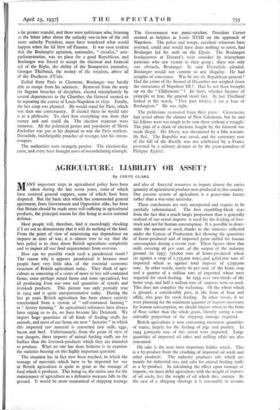A DICTATOR WHO FAILED: BOULANGER 1837-1937
By D. W. BROGAN
IT is one of the most celebrated of Marxian epigrams that " history repeats itself ; once as tragedy and once as farce." The career of General Boulanger, who was born just a hundred years ago, suggests that this epigram, like many others, can be reversed, for from one point of view Boulangism is a trial run for more recent and successful capitalisations of " national " and " socialist " feeling.
As Napoleon III and the second of December were to Napoleon I and Brumaire, so was Boulanger to Messrs. Mussolini and Hitler. The resemblance with Hitler is closer it is true than the resemblance with Mussolini. Each was leader of a national revival, each was an enemy of parlia- mentary " feebleness," " corruption " and " treason " ; each capitalised the patriotic indignation of a nation suffering from a great humiliation, a great military and political disaster. And it is no accident that, in France and in Germany, the indignation of the people reached its height when a new generation had come of age, a generation that just remembered the disaster but not the previous regime ; that was full of the anger of the defeated and free from the prudence or-panic of those who had known the actual defeat. It took less than fifteen years to overthrow the German Republic ; it took sixteen to endanger the French Republic, but the collapse of 1933 was averted in the France of 1887-9. By 1887, France had recovered from most of the wounds of 1870. Her military power was largely restored ; by 1890 the French army was to be the most formidable force in Europe after—if it was after—the German. The change in the diplomatic situation which was to make France a desirable ally for Russia was beginning to be apparent. There was occasion for patriotic pride ; there was danger of patriotic folly ; and there was permanent patriotic grievance, the loss of Alsace-Lorraine. Some person or movement was sure to be the vehicle of these emotions. Fortune decided that it should be Boulanger.
The hero was a young general as modern generals go (he was fifty) (" at your age, General. Bonaparte was dead," said a politician) ; he had a record for bravery ; a fine bcard ; a black horse ; and he had shown the soundness of his Republican principles, as Minister of War, treating strikers gently and by removing from the army list the two princes of the House of Orleans who had under the Republic preserved their military rank. To one of these, the Duc d'Aumale, he owed a good deal, and had expressed his recognition. When taxed with his later conduct he denied all his past words of gratitude. Unfortunately he had written them, but a popular hero, as Herr Hitler has shown, can afford to have a bad memory for inconvenient episodes of the past. The public was determined to have a hero, and Boulanger was that hero. He owed some of his fame at the beginning to a popular song, whose verses, even if they are almost doggerel, do reveal one side of Boulangism, the side that resembles the emphasis on honour and military equality in modem Germany : " Gais et contents, Nous marchions triomphants, En allant a Longchamp, Le coeur l'aise, Sans hesiter, Car nous allions feter Voir et complimenter L'armee francaise."
The incarnation of the revived French army was the bray' general. It was easy for eminent veteran politicians like Jules Ferry to talk of Boulanger as a Saint-Arnaud de café- concert but, as Jacques Bainville has put it, le café-concert, ne l'a pas qui veut. Since Boulanger had the Paris music- halls with him and as it was still believed that Paris led France, Boulanger was worth conciliating and using. The Radicals, to whose leader, Clemenceau, Boulanger owed a great deal, used him to keep Ferry out of the Presidency when the Wilson scandal drove Grevy out of the Elysee. The scandal was not in itself of the first order ; had the enemies of the Republic but known, there was imminent a far greater scandal, and there were politicians who, listening to the bitter jokes about the unlucky son-in-law of the still more unlucky. President, must have wondered what would happen when the lid blew off Panama. It was soon evident that the Boulangist agitation, nationalist, " socialist," anti- parliamentarian, was no place for a good Republican, and Boulanger was forced to accept the electoral and financial aid of the Right, the ability of the Bonapartist journalist, Georges Thiebaud, the money of the royalists, above all of the Duchesse d'Uzes.
Exiled from Paris to Clermont, Boulanger was hardly able to escape from his admirers. Removed from the army for flagrant breaches of discipline, elected triumphantly by several departments to the Chamber, the General seemed to be repeating the course of Louis-Napoleon in 185o. Finally, the last coup was planned. He would stand for Paris, which was then one constituency. If elected there he would take it as a plebiscite. To elect him everything was done that money and zeal could do. The election expenses were immense. All the polemical genius and popularity of Henri Rochefort was put at his disposal to win the Paris workers. Deroulede, indefatigable preacher of revenge, lent his storm- troopers.
The authorities were strangely passive. The election-day came, and every hour brought news of overwhelming triumph. The Government was panic-stricken. President Carrot seemed as helpless as Louis XVIII on the approach of Napoleon. The police and troops, excellent witnesses have asserted, could and would have done nothing to resist, had Boulanger led his mob on the Elysee. The Boulangist headquarters at Durand's were crowded by triumphant partisans who saw victory in their grasp ; there was only one obstacle, Boulanger. In vain Deroulede pleaded. Boulanger would not consent to any illegality. He had scruples of conscience. Was he not the Republican general ? Had the crime of the Second of December not weighed down the conscience of Napoleon III ? Had he not been brought up on the. " Chatiments " ? In short, whether because of principle or fear, the general stood fast. At last Thiebaud looked at his watch, " Five past twelve, I am a bear of Boulangism." He was right.
The politicians recovered from their panic. Clemenceau had jested about the climate of New Caledonia, but he and his fellows were too tough to be sent there without a struggle. The plan of a chain of elections fought by the General was made illegal. His liberty was threatened by a fake warrant. He fled. The Republic was saved, and the centenary year of the fall of the Bastille was not celebrated by a France governed by a military dictator or by the great-grandson of Philippe Egalite.











































 Previous page
Previous page